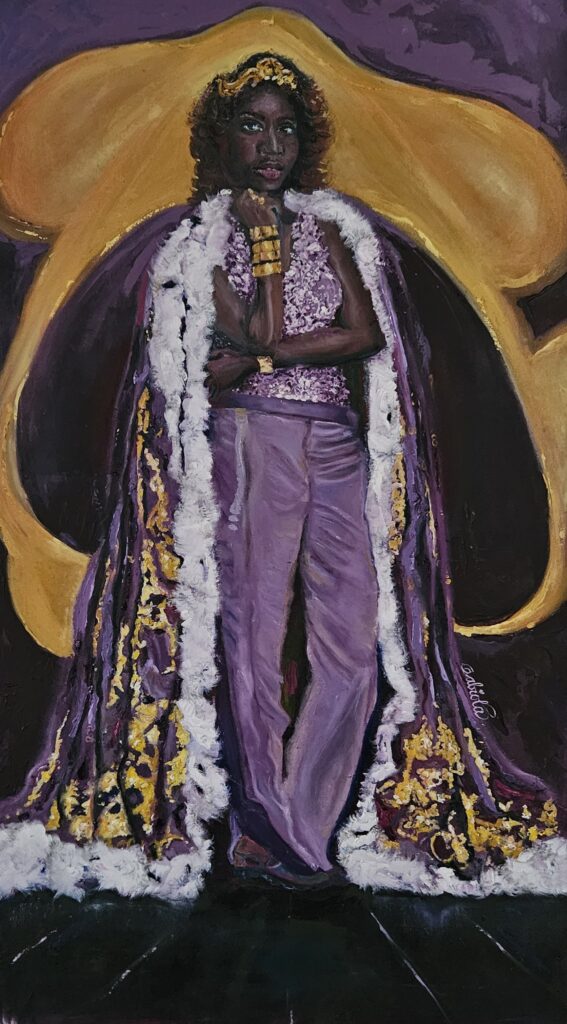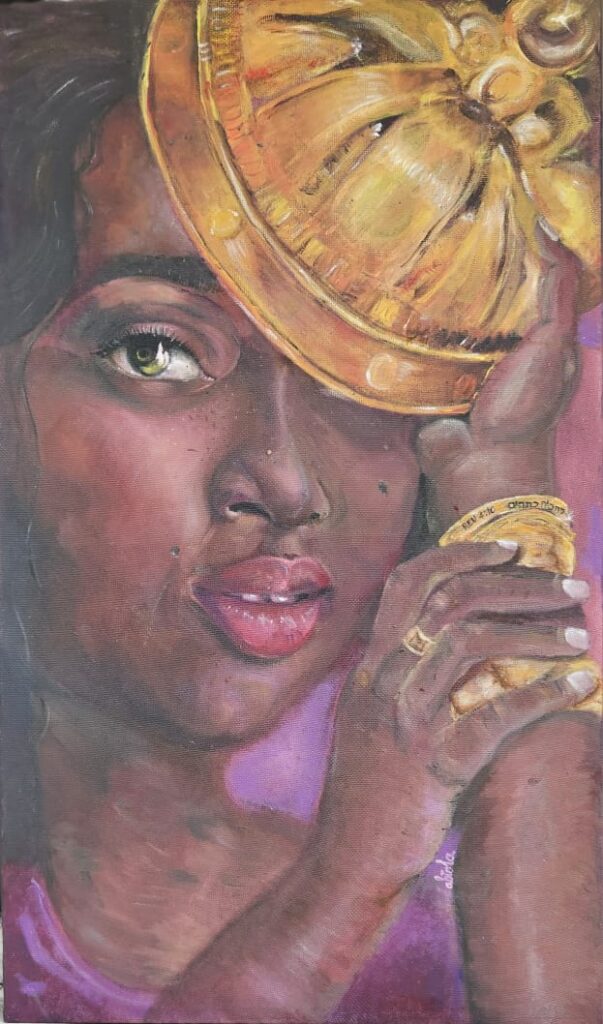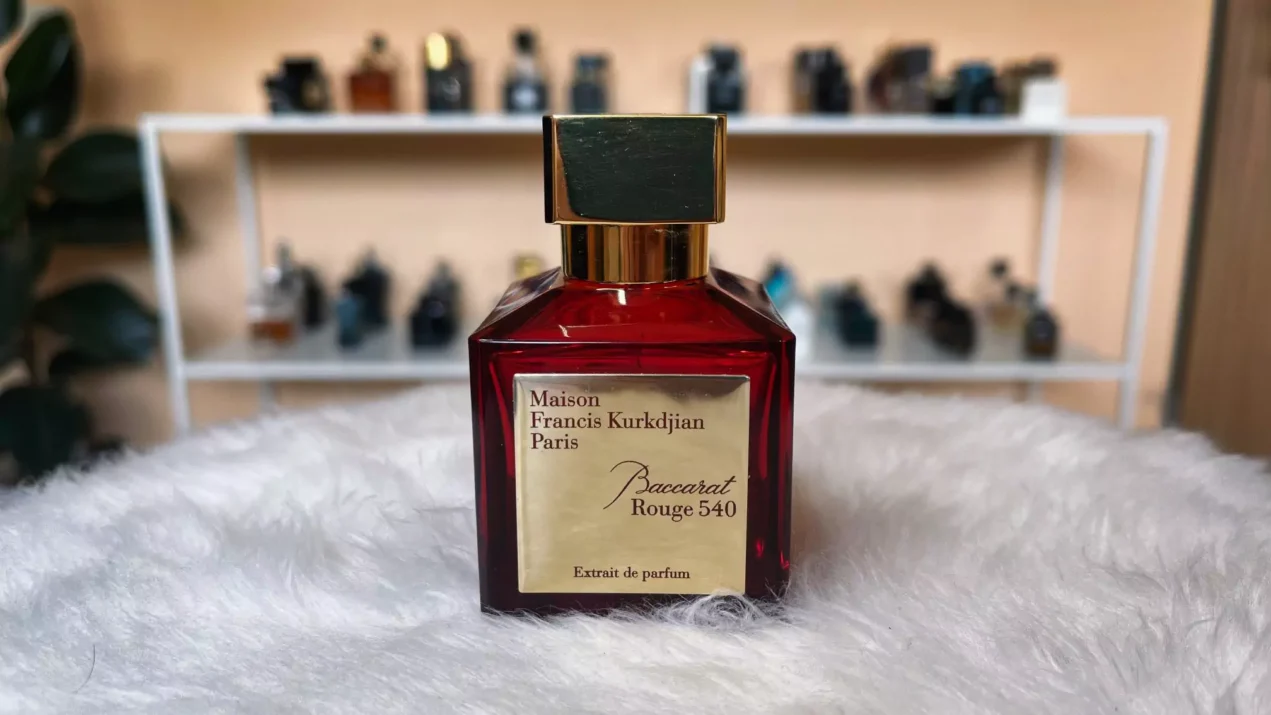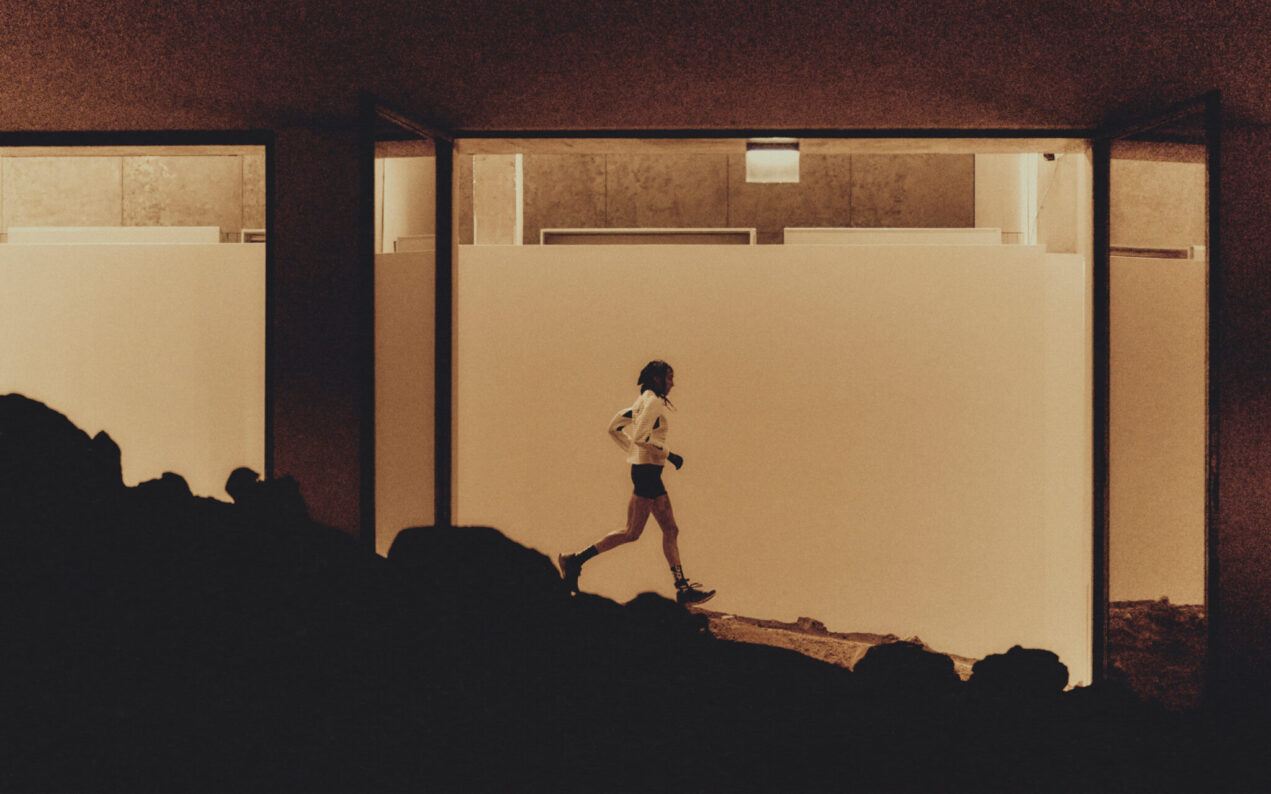The Nigerian art scene is experiencing a renaissance, with a new generation of artists shattering stereotypes. Once overshadowed by more established global markets, the country’s creative space is now commanding attention, with Nigerian artists fetching record prices at international auctions and making their mark in prestigious galleries. But beyond the headlines and commercial success lies a deeper conversation, one about power, identity, and the role of women in the ever-evolving art world. At the heart of this dialogue is Hadiza Shehu, a rising talent whose foray into art wasn’t a conventional one. Unlike many who nurtured their craft from childhood, she rediscovered her passion in the solitude of the COVID-19 pandemic, taking a leap of faith that would redefine her path.
Today, she is making waves with her bold, realism-leaning compositions and a distinct fascination with power dynamics between humans and between humanity and the divine. In this exclusive interview, Hadiza speaks candidly about her inspirations, her unique creative process, and her unapologetic stance on gender and success in Nigeria’s art scene.
FAB: Can you tell us about your background and how you first discovered your passion for art?
Hadiza Shehu: I discovered my passion during covid. After a discussion with myself, I realized I wanted to pursue my childhood passion of being an artist. I went and enrolled at the University of Lagos, and within that space of time, I’ve been able to learn and practise different forms of art, especially painting.
FAB: What inspires your work?
Hadiza Shehu: I’m inspired by the power play and dynamics between humans and also between God and humans.
FAB: Do you remember the first artwork you ever created? What was it, and how did it make you feel?
Hadiza Shehu: I remember completely losing track of time—that’s when I knew I had found something I truly loved. It was my first university assignment: the colour wheel. I’m not sure it was my best work, but funnily enough, I don’t even have it anymore; someone bought it.

FAB: Who are your biggest influences (whether in the art world or outside of it)?
Hadiza Shehu: I love fashion design and art, so it’s hard to say where my biggest influences come from.
FAB: How would you describe your artistic style, and what makes it unique?
Hadiza Shehu: My artistic style tilts towards realism and holds its uniqueness in the sense of compositions and colour combinations.
FAB: What’s your creative process like, from the moment an idea comes to you to the final piece?
Hadiza Shehu: My creative process starts with thought; I then find inspiration that fleshes out my idea. A small sample composition is made before the final painting.
FAB: What materials and techniques do you enjoy working with the most?
Hadiza Shehu: I enjoy working with oil, but acrylic properties are making it a hot favourite right now. I’m currently learning how to carve wooden panels.
FAB: Is there a specific theme or message that runs through your work?
Hadiza Shehu: Absolutely, I’m obsessed with the theme of power.

FAB: As a female artist in Nigeria, what challenges have you faced, and how have you overcome them?
Hadiza Shehu: So far, I haven’t encountered any challenges. I believe art in Nigeria is gender-blind—it all comes down to your ability to deliver on your promises.
FAB: What has been the most rewarding moment in your career so far?
Hadiza Shehu: I think it was when I sold my first painting. I couldn’t believe someone paid for it.
More Like This
5 Nigerian Fashion Brands That Will Take Your Breath Away
Chinyere Ibenye: The Artistic Journey of a Nigerian Female Artist
Solomon Okpurukhre on Why Many Artists Fail to Make Money from Their Work
FAB: Have you ever doubted your abilities as an artist? If so, how did you push through those moments?
Hadiza Shehu: Every day, I remind myself how far I’ve come and that there’s nothing to go back to, only forward.
FAB: How do you confront the conflict between creating for yourself and meeting market or audience demands?
Hadiza Shehu: I try to be flexible. Everything is new to me, so I try to explore new possibilities and see what else I can do.
FAB: How would you describe the state of the art scene in Nigeria, particularly for women?
Hadiza Shehu: The art scene is vast, with opportunities everywhere. It’s all about connecting with the right people and engaging the opportunities available for women to thrive.
FAB: What changes would you like to see in how female artists are supported and recognized in Nigeria?
Hadiza Shehu: I’d love to see greater engagement from female artists, more collaborations, and a stronger sense of openness—lifting each other up, just like our male counterparts do.
FAB: What role do you think art plays in addressing societal issues, especially those affecting women?
Hadiza Shehu: Art serves as a platform by which issues can be addressed in a nonjudgmental environment. Since art itself is subjective, ideas and issues can thrive and solutions imagined.
FAB: How do you see Nigerian art contributing to global culture?
Hadiza Shehu: Nigerian art has just arrived on the global stage; definitely, I believe it will explode until we are at par with our international contemporaries.
FAB: Where do you see your art taking you in the next five years?
Hadiza Shehu: In the future I envision that art will have taken me down rivers I never thought of, crossed oceans I never envisaged, and increased my life exponentially.
FAB: What advice would you give to aspiring female artists who are just starting out?
Hadiza Shehu: My advice to younger female artists is to keep on exploring; let’s push boundaries and collaborate more.
FAB: How do you hope your work impacts future generations of female creatives?
Hadiza Shehu: I’m a firm believer in art that transcends time, so I would love it if my work were viewed a hundred years later and still felt the same as today.
FAB: What’s your favourite piece you’ve ever created, and why?
Hadiza Shehu: My favourite piece is a self-portrait I created last year. I loved it because I was both the artist and the client—my opinion was the only one that mattered.
FAB: If you weren’t an artist, what other career path might you have chosen?
Hadiza Shehu: If I weren’t an artist, I would be an architect or a leather bag maker.
FAB: How do you unwind or recharge when you’re not creating art?
Hadiza Shehu: I unwind by being in a room by myself, reading or just meditating and allowing myself to wander.
FAB: Do you have any rituals or habits that fuel your creativity?
Hadiza Shehu: Yes, I enjoy being in a quiet space, mentally visualizing my composition before sketching it out and making any necessary corrections.
FAB: What’s one thing people might be surprised to learn about you?
Hadiza Shehu: I’m a serious introvert; I hate crowds.






